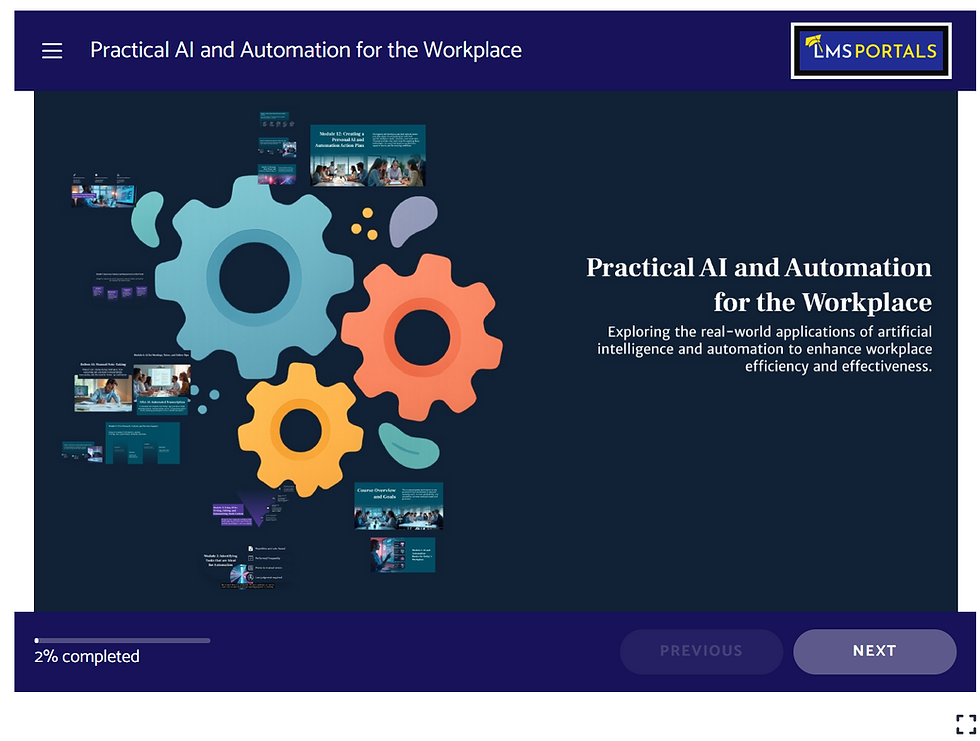eLearning for HIPAA and OSHA Training
- LMSPortals

- Mar 16, 2020
- 3 min read
Updated: Apr 25, 2021

HIPAA and OSHA are both federal laws, each impacting individual health. The purpose of The Health Insurance Portability and Accountability Act (HIPAA) is to outline regulations regarding the security and privacy of patient protected health information (PHI). The federal Occupational Safety and Health Act of 1970, commonly referred to as the OSH Act, led to the establishment of OSHA. The agency oversees the requirements of the OSH Act, which regulates workplace health and safety.
For many organizations, the rules for each will apply. And in order to effectively meet and ensure employee adherence to these regulations, comprehensive eLearning programs can provide an easily-managed and cost-effective option.
An Overview of the HIPAA Rules
Since HIPAA was first enacted (in 1996), it has undergone several changes and expansions. Together, these standards are referred to as the HIPAA Rules, which include:
HIPAA Privacy Rule: Establishes the standards for the privacy, integrity, and availability of PHI.
HIPAA Security Rule: Sets standards for overseeing the protection of PHI through a series of safeguards that both CEs and BAs must apply.
HIPAA Breach Notification Rule: Defines the processes that relevant entities must follow in the event of a data breach.
HIPAA Omnibus Rule: Applied several major revisions to the HIPAA regulation, specifically regarding the roles and responsibilities of BAs.
Organizations that Must Meet HIPAA Requirements
There are two types of organizations that fall under HIPAA guidelines:
Covered Entities (CE): CEs are organizations that drive the creation of PHI, such as healthcare providers, health insurance plans and healthcare clearinghouses. These organizations must be compliant with the full range of HIPAA regulations.
Business Associates (BA): A BA is an organization hired by a CE (or by another BA) that will encounter PHI in the work they’ve been hired to perform. BAs often include practice management firms, IT providers, storage providers, and email encryption service providers, among others. While there is not a requirement for BAs to comply with the entirety of the HIPAA Privacy Rule, they must meet the rest of the regulatory standards.
What is OSHA?
OSHA sets and enforces standard that help ensure safe and healthful conditions for working men and women. To that end, OSHA also provides training, outreach, education and assistance. OSHA creates a set of required regulations and standards that are published by the Department of Labor. These serve as benchmarks for determining whether employers are in compliance with OSHA standards to regulate workplace health safety. OSHA standards are segmented into a separate set of standards for General Industry, Construction, and Maritime. OSHA enforces these regulations and is authorized to issue fines for any failure to comply.
What Does OSHA Regulate?
OSHA’s mission is to regulate the health and safety of the workplace. Some OSHA regulations include:
Minimizing the presence of airborne contaminants
The requirement of employers to provide protective equipment when employee jobs call for it
Minimizing employee exposure to the harmful effects of chemicals
Ensuring emergency preparedness and fire safety in the workplace
The Intersection of HIPAA and OSHA
HIPAA and OSHA do intersect, given that OSHA compliance calls for the documenting some specific information that is protected under HIPAA. The HIPAA Privacy Rule obligates CEs to apply safeguards to prevent the improper use of PHI, including any illegal disclosure of PHI. The general requirement of the HIPAA privacy rule is that CEs cannot utilize or disclose PHI unless they have written authorization from that person.
eLearning for HIPAA and OSHA Employee Training
Employee training is an integral part of any organization’s efforts to meet and adhere to both HIPAA and OSHA regulations. In recent years, as SaaS-based technologies have continued to evolve, eLearning has emerged as a viable option for any organization looking to offer comprehensive and cost-effective training programs.
LMS Portals offers a powerful Learning Management System (LMS) platform that allows our clients to launch and manage eLearning programs on their own corporate-branded portals. The LMS Portals system includes robust supporting tools for employee onboarding, messaging, analytics, knowledge management, and more.
Contact us today to get started for free!



Comments